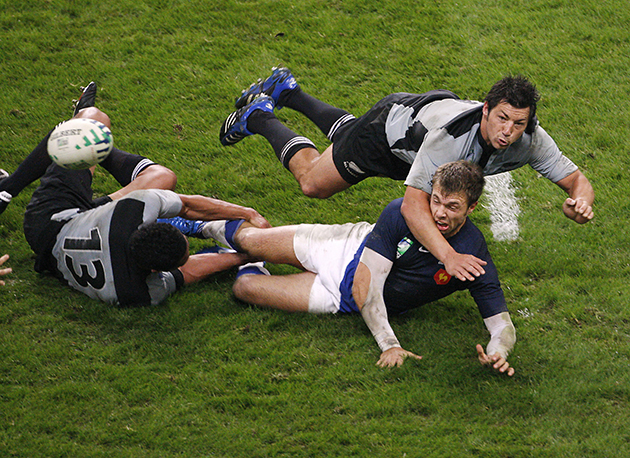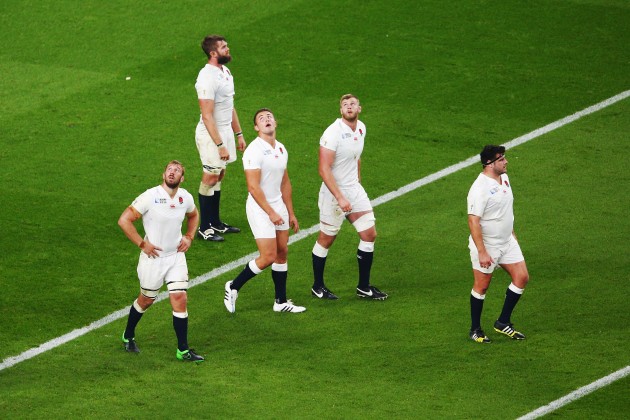Following England's exit from the World Cup, should Stuart Lancaster remain as head coach?
By Owain Jones & Sarah Mockford
England‘s defeat by Australia on Saturday condemned them to an early exit from their own World Cup. It’s the first time England have failed to make the knockout stages. So what now for head coach Stuart Lancaster? Here Rugby World presents the arguments for why he should stay and why he should go – and gives you the chance to vote in our poll…
REASONS WHY HE SHOULD STAY…
Learning lessons
As Wales coach Warren Gatland said following England’s exit, you learn more from losses than you do from successes. It’s a point that has been proven many times over the years.
Sir Clive Woodward got a second chance after England were knocked out of the 1999 quarter-finals and went on to lift the trophy four years later with many of the same players. A more fitting example is Graham Henry. He, like Lancaster, had four years in the New Zealand job before RWC 2007 but the All Blacks suffered an embarrassing defeat by France to exit at the quarter-final stage for the first time. The NZRU kept faith in Henry and in 2011 he ended the country’s 24-year wait to lift the Webb Ellis Cup for a second time.
It’s a painful time for Lancaster and England right now, but he’s long said that this group of players will hit their peak in 2019 and he could use the hurt and experience of this World Cup to be better prepared for the one in Japan.
Knowledge base
No one in English rugby knows more about up-and-coming players than Lancaster. He’s been involved in the RFU set-up since 2008, his primary responsibility before taking the No 1 job to develop young players, and his brain is bursting with knowledge about the next generation – and even the generation after that!
He has tables showing lists of players in every position, depth charts if you will, and has proven that he can bring the best out of young players. If the RFU let him go, they would be losing a valuable resource. Kevin Bowring, the RFU’s long-term Head of Elite Coach Development is retiring, so there could be a role that would bring the best out of Lancaster.
Culture club
The last few months, and particularly the last three weeks, have overshadowed the sterling work Lancaster has done since taking the reins in 2012. When he was appointed interim coach morale was at an all-time low, as was public opinion of the team, following England’s dismal showing on and off the field at RWC 2011.
Lancaster played a leading role in rebuilding England’s relationship with the fans and the media after that tournament. He took a tough stance on off-field ill-discipline from the start and wasn’t afraid to drop players from the squad for such misdemeanours, making it abundantly clear what high standards he expected. He worked on instilling a club culture in the national team and restoring pride in wearing the jersey.
After many a club-versus-country row, he also helped build a positive relationship with Premiership Rugby, his stance on not picking overseas-based players no doubt playing a key role.
REASONS WHY HE SHOULD GO…
First hosts to go out before the knockout stages
There is no getting away from this fact. Granted England were in the toughest World Cup Pool in history but they had home advantage in the familiar tub-thumping environs of Twickenham – backed up with lofty soundbites about making Twickenham a fortress. Consecutive losses to Wales and Australia put paid to those pipe-dreams and they left HQ with boos, not cheers, ringing in their ears, after a 33-13 humbling by Australia. The World Cup party has had to go on without them and they have no one else to blame. They were simply found wanting on the world’s biggest stage, and that is something Lancaster has said he may never recover from.
Increasingly muddled midfield selection
Lancaster started out with a bloated 51-man squad, and that was finally whittled down to 31, including the untested Bath backrow Sam Burgess pegged as a centre but missing Northampton’s Luther Burrell, the incumbent in England’s midfield for a good chunk of Lancaster’s tenure. The backline had prospered during the Six Nations, as they ran in 18 tries, with George Ford and Jonathan Joseph underpinned their new joie de vivre. After a jolting loss against France in Paris, and a deemed lack of control against Fiji, Lancaster panicked and Ford was demoted to the bench behind Farrell, leading to a change in gameplan. With fate depriving England of Joseph before the Wales game, a robust yet creatively limited 10, 12, 13 combination of Owen Farrell, Burgess and Brad Barritt saw cut off the supply line to England’s best functioning unit, the back three, thus nullifying their potency. Henry Slade, a creator with sublime gifts, was left without a minute’s game time.
Set-piece regression
One of the most alarming issues for England was their set-piece malfunction. In the warm-ups, their lineout stopped working with Tom Youngs’ darts not hitting their targets, leading to his Leicester partner Geoff Parling being recalled – which gave away some ballast in the second-row. At the same time, England’s scrum, once so dominant, started struggling as a unit.

Smashed: England’s set-piece was dismantled by a Wallaby pack that had been pilloried in recent years
Twice against France they came off second best, and while they had the nudge against Wales, it completely collapsed against Australia as they gave away five scrum penalties, leading to Joe Marler being hooked after 49 minutes. The final humiliation was the Wallabies requesting a scrum after being given a penalty, such was their dominance on England’s home patch.
Inflexibility over players
After 2011, England built a culture which focused on self-discipline, no egos and a team-first ethos. While their moral compass was recalibrated, this was too rigidly enforced. As Lancaster would know, not all schoolchildren are the same, and rugby is no different. Dylan Hartley was banned for the Fiji game but could have been available but under Lancaster’s strict moral code he was not accommodated. How England missed his leadership, scrummaging ability and ‘dog’. Danny Cipriani was another not to make the squad with the suspicion his individualistic personality counted against him, while Nick Easter – another with his own mind – only made it into the squad after injuries
Tactical naivity

Peerless: David Pocock broke English hearts with a world-class display to which England had no answer
England known they would face the twin threat of Wales and Australia for nigh on three years. That the two sides possess four of the best opensides in the World, in Michael Hooper, David Pocock, Sam Warburton and Justin Tipuric was also heavily documented. England stubbornness not to come up with a tactical plan to counter this hurt them, particularly against Australia, where Pocock and Hooper won five turnovers, mostly when England were in strong attacking positions. Chris Robshaw has and never will share the same rarefied company as a breakdown specialist – he’s a fine player, it was simply asking too much. England’s other breakdown operators, Dan Cole and Joe Launchbury were also unable stop ‘Pooper’. As for Steffon Armitage’s exclusion, that’s a different argument again…
For the latest Rugby World subscription offers, click here.








